Diplomatic Bluebook 2023
Chapter 3
Japan's Foreign Policy to Promote National and Global Interests
Section 2 Japan's International Cooperation (Development Cooperation and Response to Global Issues)
In 2022, Russia's aggression against Ukraine had serious impact not only in Ukraine and surrounding nations, but also across the entire world. Amid this, Japan made efforts to assist Ukraine through efforts such as humanitarian assistance through international institutions, while working closely with other members of the G7 and the international community (for reference, see Special Feature “Russia's Aggression Against Ukraine and Japan's Response ” 2-(2) on page 19).
The year 2022 proved to be a year when the role of Japan's development cooperation was reaffirmed even more so than before in order to safeguard a free and open international order based on the rule of law.
1 Development Cooperation
(1) Revision of the Development Cooperation Charter
In September 2022, the Government of Japan announced that it would revise the Development Cooperation Charter, which is the foundation of Japan's development cooperation, based on major changes in the international situation that have taken place since the document was formulated in 2015, in order to update approaches to development cooperation more in line with the times and to ensure its implementation is more effective and strategic in nature.
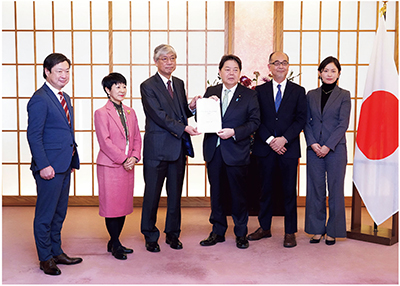 Submission of the report from the Advisory Panel on the Revision of the Development Cooperation Charter to Foreign Minister Hayashi (December 9, Tokyo)
Submission of the report from the Advisory Panel on the Revision of the Development Cooperation Charter to Foreign Minister Hayashi (December 9, Tokyo)Upon considering the revision of the Charter, an advisory panel on the revision of the Development Cooperation Charter was established under Foreign Minister Hayashi composed of eight members and chaired by NAKANISHI Hiroshi, Professor at the Graduate School of Law, Kyoto University. After a total of four meetings, in December Chairperson Nakanishi submitted to Foreign Minister Hayashi a report summarizing the advisory panel's discussions.
The report identified the following three policies, placing human security as the foundation for the direction of development cooperation in the future: (1) contribution to maintaining the international order based on universal value as the foundation for peace and prosperity, (2) creating an environment of mutual help and co-creation, where Japan and the world develop and prosper together, and (3) leading international efforts to address increasingly complex and serious global issues. Furthermore, the report's specific recommendations for the strategic utilization of Official Development Assistance (ODA)1 include: 1) stronger cooperation with partners, including like-minded countries, the private sector, and civil society, 2) more flexible and efficient assistance methods, and 3) increasing the attractiveness of Japan's development cooperation by leveraging its advantages through improved offer-based assistance.
The Government of Japan plans to finalize the new charter around the first half of 2023 based on this report from the advisory panel and through discussions held with a broad range of stakeholders including civil society and business circles.
- 1 Official Development Assistance (ODA): For details on Japan's international cooperation, refer to “White Paper on Development Cooperation: Japan's International Cooperation.”
https://www.mofa.go.jp/policy/oda/page_000017.html
(2) Japan's ODA
In 2021, Japan provided approximately 17.63 billion US dollars (+8.4% year on year) in ODA2, based on the grant equivalent system (GE system)3. Japan ranks third among the member states of the DAC, following the U.S. and Germany. The ODA/GNI ratio based on the GE system was 0.34%, placing Japan in 12th place among member states of the DAC (Source: OECD Database (OECD.Stat) (December 2022)).
- 2 The main modalities of ODA from Japan are: grants including grant aid, debt relief, grants through multilateral institutions and technical cooperation, government loans, and contributions and subscriptions to multilateral institutions.
- 3 Grant Equivalent System (GE system) was introduced by the Organisation for Economic Co-operation and Development's Development Assistance Committee (OECD/DAC) in 2018 as the standard method for calculating ODA loans. The grant equivalent of government loans, is calculated as ODA flows. The GE system records the amount of government loans by applying the terms of the loan, such as the amount of loan provided, interest rate and repayment period, to a formula. The more concessional the terms of the loan are, the larger the grant equivalent is. Compared to the net flow system (the full amount of loan is recorded, on the other hand, the amount repaid is counted as negative) that was the standard method used by the OECD/DAC, the GE system measures Japan's actual government loans more accurately.
(https://www.mofa.go.jp/mofaj/gaiko/oda/files/100053766.pdf). (Japanese only)
(3) Development Cooperation in 2022
In 2022, Japan engaged mainly in the following (A to E below) in order to promote strategic and effective development cooperation, with the Development Cooperation Charter positioned at the core of these actions.
A Support for Ukraine and Neighboring Countries and Support for the Global South
To date, Japan has pledged to provide Ukraine and surrounding countries impacted by Russia's aggression against Ukraine with a total of approximately 7.1 billion US dollars covering the fields of finance, humanitarian assistance, food, and recovery and reconstruction. This includes the announcement of an additional financial assistance of approximately 5.5 billion US dollars for Ukraine announced in February 2023 on the condition of approval of relevant budgets and laws by Japan's Diet. These funds are now being rolled out. From the early days of Russia's aggression against Ukraine, Japan has quickly implemented humanitarian assistance for Ukrainian displaced persons including in the areas of medical and health, water and sanitation, shelters, food, and protection of women and children, in addition to financial assistance. Japan has also steadily provided generators and solar lanterns, among other items, to help the Ukrainian people as support for winterization, following the destruction of many energy and infrastructure facilities due to Russian attacks, which has resulted in large and widespread power outages. The Global South including developing countries have been exposed to a complex humanitarian crisis resulting from the growing seriousness of food insecurity and food shortages caused by the impacts of Russia's aggression against Ukraine. In response to global food security issues, Japan is providing food assistance and support to increase food production capacity through bilateral arrangements, international institutions, and NGOs in Japan.
B Achievement of a Free and Open Indo-Pacific (FOIP)
Second, Japan is promoting concrete initiatives utilizing ODA strategically in order to achieve a “Free and Open Indo-Pacific” (FOIP) together with the broad range of partners in the international community who share this vision and the Indo- Pacific region, which is a focal point of the world's vitality. This vision is also shared by countries including the U.S., Australia, India, the Association of Southeast Asian Nations (ASEAN). The importance of this vision has further increased amidst Russia's aggression against Ukraine, an act that shakes the international order.
Over the years, Japan has developed “quality infrastructure” for building regional connectivity, assisted in legal system development, offered training on public debt and risk management for ensuring debt sustainability, and capacity building for debt management and macroeconomic policy, and for maritime law enforcement agencies for securing safety at sea (provision of patrol vessels and coastal monitoring radars as well as human resources development, etc.). Japan will continue to offer these in the future.
The development of quality infrastructure is an important foundation for achieving FOIP and is particularly necessary in the recovery from the COVID-19 pandemic. From this standpoint, it is important to continue to disseminate and implement the G20 Principles for Quality Infrastructure Investment, endorsed at the G20 Osaka Summit of 2019 as an international standard, including such principles as openness, transparency, economic efficiency in view of life-cycle costs, and debt sustainability. At the G7 Elmau Summit in June, the Partnership for Global Infrastructure and Investment (PGII) was launched as an initiative to promote quality infrastructure investment through collaboration with countries, including the G7.
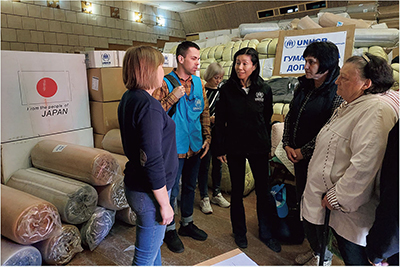 The author (center) distributing emergency relief supplies from Japan in Vinnytsia, Central Ukraine (Photo: Anita Rudyk, UNHCR)
The author (center) distributing emergency relief supplies from Japan in Vinnytsia, Central Ukraine (Photo: Anita Rudyk, UNHCR)Ukraine entered a state of emergency since the launch of Russian military aggression on February 24. As of December 2022, more than 7.8 million Ukrainians have evacuated to various countries of Europe, and more than 5.9 million people in Ukraine have been internally displaced.
As intense battles continue to rage in the eastern and southern parts of Ukraine, the impact on civilian life has become increasingly serious, with emergency power cuts being implemented in various regions due to severe power shortages caused by missile attacks by the Russian military on infrastructure, particularly power generation facilities. With the growing severity of the winter cold, heating facilities for internally displaced persons and local residents are being installed across Ukraine in preparation for a large-scale power outage.
The people of Ukraine continue to live under extremely difficult circumstances, experiencing power and water cuts while being exposed to the terrors of bombings. Power generators and emergency relief supplies are important for protecting the lives and dignity of every individual, and the support from Japan is greatly appreciated.
The main activities of UNHCR in Ukraine include protecting displaced persons, supporting emergency relief supplies, cash assistance, and temporary evacuation shelters. UNHCR works closely with the Ukrainian authorities to continue providing assistance that meets the needs on the ground, in order to protect and support internally displaced persons, those who have been affected by the war, and those who have returned to their hometowns. Among these efforts, providing protection against the cold and support for winterization are top priorities for UNHCR. To that end, it provides cash assistance to address specific winter needs, repairs houses, and provides supplies such as thermal blankets, sleeping bags, thermos flasks, heaters, and winter clothing.
Specifically, UNHCR, together with local NGO partners, provides legal assistance and support for acquiring various documents, psychological and social support, information on protection, and counselling services, as well as assists with registration for receiving cash assistance. At the same time, UNHCR is also working to strengthen the system for protecting those who require support the most, and persons with special needs. The impact on mental health as a result of protracted life in displacement, missile attacks, and power shortages, among other difficulties, is of great concern. Therefore, there is a growing need for the continuous provision of mental care and counseling support. UNHCR works in cooperation with NGO partners to provide support for psychological first aid and to conduct recreational activities to help children recover mentally, among other efforts.
UNHCR also supports the initiatives of the Ukrainian government for repairing buildings and rebuilding lives, in order to ensure that refugees and internally displaced persons have the option of returning to their hometowns voluntarily and with dignity in the future. To that end, it provides materials and cash for repairing houses that have been damaged in missile attacks and also helps to repair evacuation shelters.
Going forward, UNHCR will continue to provide humanitarian assistance as far as possible, and stay on the ground in cooperation with various states, municipal governments, local communities, and domestic partners in Ukraine. At the same time, it will also work on building a foundation for reconstruction and rebuilding.
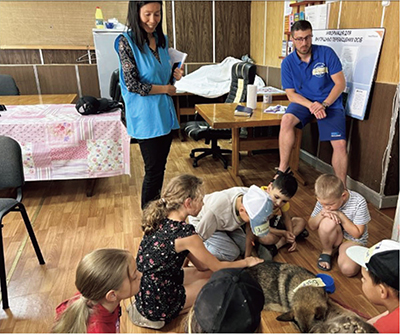
 Engaging in psychological and social support activities for children at evacuation shelters, in Vinnytsia, Central Ukraine (Photo: Anita Rudyk, UNHCR)
Engaging in psychological and social support activities for children at evacuation shelters, in Vinnytsia, Central Ukraine (Photo: Anita Rudyk, UNHCR)C Countermeasures against COVID-19
Third, in relation to the COVID-19 pandemic, Japan continued to support cold-chain development for developing countries with vulnerable health systems in 2022, and extended its assistance in meeting the needs of developing countries in order for them to promote economic and social revitalization and resumption of cross-border travels in preparation for the post-pandemic phase. Specifically, Japan is implementing assistance to the scale of 100 million US dollars (approximately 10.8 billion Japanese yen), primarily in the Indo-Pacific region, around three thematic pillars of vaccination data management, management of the border control system, and infectious disease-related waste disposal. In particular, the Government of Japan co-hosted the COVAX AMC Summit4 in June, in which the Prime Minister, as a co-chair called for further solidarity and commitments from the international community in the fight against COVID-19 in terms of vaccines. As a result, we were able to secure funding well beyond the target. Furthermore, Japan provided the Crisis Response Emergency Support Loan up to 700 billion Japanese yen from FY2020 until FY2022 to contribute to maintaining and revitalizing economic activities in developing countries. Japan's assistance has been lauded by other countries.
Japan will continue to provide assistance toward vaccines, treatments and diagnostics for overcoming the current COVID-19 pandemic. Moreover, Japan will also offer assistance for health security in a broad range of fields including water and sanitation and for improving health and medical systems in developing countries in preparation for future health crises.
- 4 COVAX Vaccine Summit: Japan hosted the summit jointly online with the Global Alliance for Vaccines and Immunisation (Gavi) in June 2021. The summit contributed to securing funding that greatly exceeded the amount (8.3 billion US dollars) required for providing 1.8 billion doses of vaccine representing 30% of the developing world by the end of 2021. Japan announced that it will provide a total of 1 billion US dollars and 30 million vaccine doses to the Advance Market Commitment (AMC) of the COVID-19 Vaccine Global Access Facility (COVAX Facility, an international, comprehensive mechanism for resource mobilization and supply coordination to ensure equitable access to COVID-19 vaccines). The summit in April 2022 was held jointly with the governments of Germany, Indonesia, Senegal and Ghana along with Gavi. There, Japan announced additional funding of up to 500 million while other governments and the private sector made announcements for additional funding totaling 4.8 billion US dollars (provisional figure).
D Addressing Global Issues
Fourth, Japan is working to address global challenges such as achieving the Sustainable Development Goals (SDGs), including combating COVID-19 and responding to global food security, based on the concept of human security. Japan will continue to actively promote development cooperation, including through humanitarian assistance, in such fields as health, food, nutrition, women (gender), education, disaster risk reduction, water and sanitation, climate change and global environmental issues. In doing so, Japan will promote visible development cooperation while utilizing collaboration with NGOs working on international cooperation. Furthermore, as humanitarian crises become prolonged and diversified, Japan will continue to promote humanitarian assistance including support for refugees and displaced persons, reducing poverty, economic and social development, peace building and nation building assistance based on the concept of “humanitarian-development-peace (HDP) nexus” to reinforce responses to fundamental causes of conflict, and provide assistance in maintaining peace in addition to humanitarian assistance and development.
E Diplomatic Efforts in Support of Japan's Economy
Fifth, Japan seeks to revitalize its own economy through the development of developing countries and Japan is promoting initiatives for achieving the growth of both. The Grand Design and Action Plan for a New Form of Capitalism and Follow-up approved in June 2022 call for utilizing ODA and public financing strategically.
To be particular, in order to have Japan's leading technologies utilized for development in developing countries, Japan will promote the acquisition of business rights and operation rights of Japanese corporations through means such as the provision of grant aid for public projects implemented through public-private partnership and furthermore, offer technical cooperation that contributes to quality infrastructure investment, such as trade facilitation and securing debt sustainability. Additionally, to encourage the overseas expansion of private companies including SMEs and local governments, Japan will increase the visibility of products and equipment that can help resolve issues in developing countries through JICA's private sector partnership in conducting surveys and verification on business models as well as continuously generate demand for these. Through human resource development, Japan will also contribute to advancing the improvement of the business environment, thereby promoting investment and overseas expansion by corporations.
(4) Safety Measures for Personnel Engaged in International Cooperation Projects
In 2022, as countries around the world greatly relaxed their border control measures and immigration restrictions, about 80% of JICA personnel (Japan Overseas Cooperation Volunteers excluded) have returned to their overseas posts compared to before the spread of COVID-19. While overseas travel for the personnel engaged in international cooperation projects has become more active and frequent, the world faces compound crises such as conflicts, terrorism, and infectious diseases, which increase safety risks.
The Ministry of Foreign Affairs (MOFA) and JICA will further strengthen safety measures for international cooperation projects while implementing measures based on the final report of the Council on Safety Measures for International Cooperation Projects (August 2016).
(5) Initiatives in Major Regions
A East and Southeast Asia
The achievement of peace, stability, and prosperity in the East and Southeast Asia regions are important to Japan, which has a close relationship with these regions. Through development cooperation, Japan has helped these regions to resolve various development issues including poverty reduction, by promoting economic growth and human security and contributed to the development of these regions.
Above all, as member states of the Association of Southeast Asian Nations (ASEAN) are keys to achieving FOIP, Japan not only provides support toward efforts aimed at overcoming issues faced by ASEAN and further promoting integration, but also places a strong emphasis on support for the building of quality infrastructure and training of industrial human resources to strengthen regional connectivity and develop industrial foundation.
Since there is a large number of Japanese companies doing business and a large resident population of Japanese nationals in the East and Southeast Asian regions, Japan has provided intensive support against COVID-19 in the region. Specifically, Japan provided health- and medical-related equipment and provided support for improving health and medical systems in these countries through technical cooperation. Additionally, Japan provided fiscal support yen loans totaling approximately 320 billion Japanese yen to Mongolia and Southeast Asian countries to offset the economic impacts of the pandemic. Furthermore, as part of its support to ASEAN during the pandemic, Japan is also conducting training for public health workers of each ASEAN country geared toward the operation of the ASEAN Centre for Public Health Emergencies and Emerging Diseases, which will be fully supported by Japan.
Furthermore, Japan is actively providing support for capacity building for maritime law enforcement to countries positioned along Japan's sea lanes such as the Philippines and Viet Nam, with the aim of building a free and open international order. Such efforts include providing equipment such as patrol vessels and coastal monitoring radars, as well as human resource development through the dispatch of experts. Furthermore, Japan is providing consistent support to eradicate domestic and regional disparity, and support for the creation of a sustainable society in areas such as disaster risk reduction, environment and climate change, and energy. Based on the fact that it was confirmed that the principles of the ASEAN Outlook on the Indo Pacific (AOIP) and FOIP match one another at the Japan-ASEAN summit Meeting held in 2020, Japan plans to continue strengthening Japan-ASEAN cooperation going forward in terms of maritime cooperation, connectivity, the SDGs and economy, which are priority fields of the AOIP. In 2022, Japan conducted training on topics such as marine waste, cyber security, international public law and criminal justice, etc. based on the Japan-ASEAN Technical Cooperation Agreement signed in 2019. Futhermore, since the Mekong region is located at the core of the Indo-Pacific region, Japan will continue to contribute to the development of each Mekong country through the Japan-Mekong cooperation framework.
 Capacity building training for the Vietnam Coast Guard (lecture on drift forecasting) (August, Phu Quoc, Vietnam; Photo: JICA)
Capacity building training for the Vietnam Coast Guard (lecture on drift forecasting) (August, Phu Quoc, Vietnam; Photo: JICA)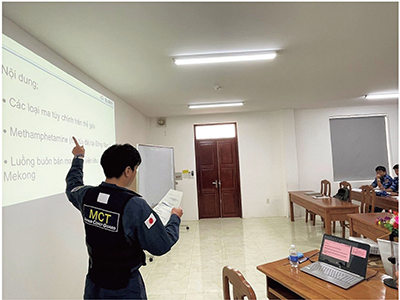 Capacity building training for the Vietnam Coast Guard (lecture introducing narcotics operations) (August, Phu Quoc, Vietnam; Photo: JICA)
Capacity building training for the Vietnam Coast Guard (lecture introducing narcotics operations) (August, Phu Quoc, Vietnam; Photo: JICA)With regards to Myanmar, in response to the worsened humanitarian situation following the coup d'état in February 2021, Japan has been providing humanitarian assistance that directly benefits the population of Myanmar (food, medical supplies, etc.) through international organizations and NGOs.
With regards to China, Japan's ODA to China that began in 1979 was terminated with no more new projects starting FY2018, and all projects have ended as of March 2022.
B Southwest Asia
Southwest Asia holds strategic importance as a marine transportation hub that connects East Asia with the Middle East, and is also a region with immense economic potential, such as India, where economic growth and massive infrastructure demand are anticipated in the future. On the other hand, the region still faces many unresolved challenges such as undeveloped infrastructure, poverty and natural disasters. Japan provides a range of assistance through ODA to assist the region in overcoming these challenges, bearing in mind the improvement of the investment environment for Japanese companies, and ensuring human security. The worldwide COVID-19 pandemic has also had a substantial impact on Southwest Asia due to its social and economic vulnerabilities along with an underdeveloped medical system. As a measure against COVID-19 in Southwest Asian countries, Japan has provided a total of 2.57 billion Japanese yen in support to four countries with an emphasis on border control management and infectious waste disposal toward economic and social revitalization and the resumption of cross-border travels. Furthermore, Japan has also provided support for improving health and medical systems through technical cooperation.
Japan has been providing support to India, which has the largest population in Southwest Asia. As part of its support for the development of economic and social infrastructure including transportation infrastructure that contributes to enhancing connectivity and strengthening industrial competitiveness, Japan has assisted with the construction of high-speed railways, subways in a number of cities, water and sewage maintenance, and road construction in India's northeast. In addition, Japan has supported India's sustainable and inclusive growth through such projects as those in the forestry sector including afforestation activities, those in the agricultural sector through production and sales promotion of horticultural crops, as well as those in the health sector that help strengthen the medical system. With regard to Bangladesh, Japan, under the Bay of Bengal Industrial Growth Belt (BIG-B) initiative, has provided support which contributes to strengthening domestic and regional connectivity, developing infrastructure, and improving the investment environment. Since August 2017, a large-scale influx of displaced persons from northern Rakhine State, Myanmar, and prolonged evacuation have resulted in the deterioration of humanitarian situations in camps for displaced persons and have also had a severe impact on the living environment of the surrounding host communities. Furthermore, displaced persons who have moved to the island of Bhasan Char are faced with poor sanitary and living conditions due to overcrowding of the camp. In response to this situation, Japan has decided to provide approximately 3.06 billion Japanese yen in support through international organizations and NGOs in the areas of water and hygiene, health and medical care, food security, livelihood assistance, etc..
Furthermore, Japan approved assistance totaling 3.41 billion Japanese yen for Sri Lanka, which has seen the humanitarian situation deteriorate due to the economic crisis that emerged in April 2022, covering such areas as food and nutrition, fertilizer, health and medical, water and sanitation. With regards to Pakistan, which has seen its humanitarian situation deteriorate due to flooding that occurred since mid-June, Japan provided emergency grant aid of 7 million US dollars for such areas as health and medical, water and sanitation following the provision of emergency relief supplies through JICA (tents and plastic sheets) and food, shelters and non-food relief supplies (mats, blankets, etc.) through international institutions. Moreover, based on local needs, Japan approved additional assistance for Pakistan of 4.21 billion Japanese yen related to such areas as health and medical, water and sanitation and food. Taking into account the Post Disaster Needs Assessment (PDNA) following the floods, Japan adopted a project for capacity development of effective river dikes management in response to 2022 flood and organized assistance led by Japanese NGOs through the Japan Platform (JPF)5.
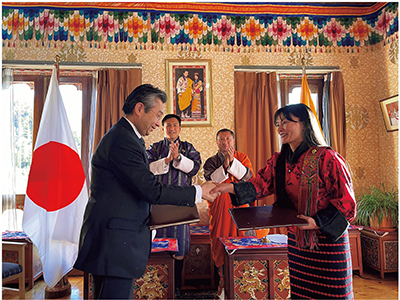 Document exchange and signing ceremony for grant aid to improve medical equipment mainly in the field of mother and child health (November 22, Thimphu, Bhutan)
Document exchange and signing ceremony for grant aid to improve medical equipment mainly in the field of mother and child health (November 22, Thimphu, Bhutan)- 5 Japan Platform (JPF): Japan Platform, or JPF, is an NGO established in August 2000 (NGO status obtained in May 2001). It was established jointly among NGOs, business and the Government of Japan with the purpose of providing prompt and effective emergency humanitarian assistance activities by a Japanese NGO in response to natural disasters and refugee situations outside of Japan.
C Pacific Island Countries
The Pacific Island countries are not only Japan's “neighbors,” connected by the Pacific, but also have deep historical connections with Japan. Moreover, as these countries possess a vast exclusive economic zone (EEZ, or areas where a country's economic right reaches), they are a key region for maritime transportation for Japan, and also provide vital fishing grounds for Japan's distant-water bonito and tuna fisheries. Therefore, the stability and prosperity of the Pacific Island countries are of great importance to Japan.
The Pacific Island countries share common issues that are unique to small island states, such as smaller economies, territories that are scattered over a wide ocean area, difficulty in breaking into the international market, and vulnerability to damages from natural disasters. In light of these circumstances, Japan, as a partner of the Pacific Island countries, is providing support to boost their autonomous and sustainable development.
In particular, at the Ninth Pacific Islands Leaders Meeting (PALM9) held via video conference in July 2021, leaders of Japan and Pacific Island nations confirmed that the countries will continue cooperation in the five priority areas of (1) COVID-19 Response and Recovery, (2) Sustainable Oceans based on the Rule of Law, (3) Climate Change and Disaster Resilience, (4) Strengthening Foundations for Sustainable and Resilient Economic Development, and (5) People-to-People Exchanges and Human Resource Development in the next three years. In the Declaration for Joint Action adopted at the summit, the document outlines specific initiatives on which Japan will provide support that are within the five priority areas such as provision, management and support on the administration of vaccines, supply of quality medical equipment and development of medical facilities, development of quality infrastructure such as ports and airports, surveillance to eradicate illegal, unreported and unregulated (IUU) fishing, disaster prevention, waste management that also includes marine plastic waste, and climate change.
Based on these five priority areas, as COVID-19 countermeasures, Japan is helping to strengthen health and medical systems including developing the cold chain and providing capacity building support for border management ahead of the reopening of international borders. Japan is also providing maritime security related equipment for keeping sustainable oceans based on the rule of law in Oceania with its expansive EEZ and assistance for upgrading power transmission systems to promote the introduction of renewable energy.
Furthermore, in June, Japan joined Partners in the Blue Pacific (PBP)6 , launched as an initiative to coordinate the approaches of various countries for providing more effective and efficient assistance to Pacific Island nations. Together with Australia, New Zealand, the UK, the U.S., Germany, Canada and others, Japan has confirmed the need to strengthen partnerships and commitments with the Pacific Islands region. In particular, Japan intends to support regional initiatives led by Pacific Island Countries on climate change and other issues.
In response to the damages caused by the volcanic eruption and tsunami that occurred on January 15, 2022, Japan has provided emergency relief supplies through JICA to Tonga, which was delivered by the Japan Disaster Relief Team (Self-Defense Forces), in light of its humanitarian perspective and its amicable relations with the Kingdom of Tonga. Furthermore, Japan has been providing Emergency Grant Aid of approximately 2.44 million US dollars to Tonga.
- 6 Foreign ministers' meeting of Partners in the Blue Pacific for cooperation with Pacific Island nations:
https://www.mofa.go.jp/a_o/ocn/shin4e_000049.html
D Latin America and the Caribbean
Latin America and the Caribbean is a region with which Japan has enjoyed friendly relations for a long time. The region also has deep historical ties with Japan, as demonstrated by the fact that around 2.3 million Japanese descendants, known as “Nikkei,” reside in the region. The region is a major supplier of resources and food, as well as a potential emerging market with gross regional production of around 5.5 trillion US dollars. On the other hand, as many countries in the region are facing challenges such as rectification of income inequality within their country, response to natural disasters, and achievement of the SDGs in each country, Japan is engaged in various cooperative efforts while also taking into account the development circumstances of each country in Latin America and the Caribbean.
To help combat the COVID-19 pandemic in Latin America, Japan has extended a COVID-19 Crisis Response Emergency Support Loan to the Dominican Republic and Honduras up to the amount of 30 billion Japanese yen in 2021, followed by the loan provided to Ecuador up to the amount of 23 billion Japanese yen in 2022.
Japan provided support to seven countries totaling 14 million US dollars in 2021 as part of the Last One Mile Support program which aims to establish a vaccination system through the United Nations Children's Fund (UNICEF). Following this, Japan initiated new support on cold chain maintenance in seven countries totaling 10 million US dollars in 2022. In response to the damages caused by natural disasters, Japan has provided emergency relief supplies (tents, sleeping pads, blankets, etc.) through JICA to Brazil that was affected by flood, and to Honduras, Guatemala, Cuba, and Belize that were affected by tropical storms and hurricanes. For Haiti, Japan has provided reconstruction support through the United Nations Development Programme (UNDP) to rebuild hospitals and police stations damaged by the 2021 earthquake, and has decided to provide emergency grant aid totaling 3 million US dollars as humanitarian assistance to address the cholera outbreak through UNICEF and the UN World Food Programme (WFP) in 2022. For Suriname, Japan has decided to extend assistance for developing drainage pumps as a countermeasure against floods.
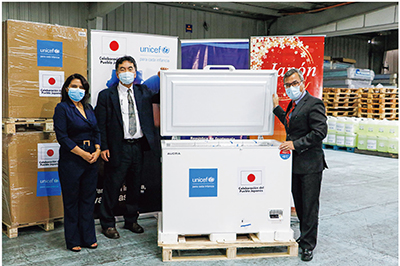 Handover ceremony for equipment donations supporting the Last One Mile (June 8, Guatemala City, Guatemala)
Handover ceremony for equipment donations supporting the Last One Mile (June 8, Guatemala City, Guatemala)Furthermore, Japan provides support based on the needs of each country. For example, to improve logistics functions in Central America, Japan approved yen loans of approximately 50 million US dollars for bypass construction in El Salvador and grant aid for the reconstruction of bridge on National Road No.1 in Honduras. In the water sector, Japan approved grant aid to Paraguay for improving the water supply, and in the area of the environment, Japan approved yen loans totaling 45 million US dollars to Peru for improving waste disposal and management capacity. In recent years, as there has been a growing number of immigrants and displaced people from Central America and Venezuela making their way to neighboring countries and the U.S., Japan is providing various forms of assistance to help resolve issues in the areas of poverty, security and disasters, which are the root causes of immigration out of Central America. Furthermore, in 2022, through international organizations, Japan provided grant aid in the areas of water and sanitation for Venezuela, and also extended support for protection of displaced people, humanitarian assistance and socioeconomic integration in Columbia, Ecuador, and Venezuela.
E Central Asia and the Caucasus
Central Asia and Caucasus are surrounded by Russia, China, South Asia, the Middle East and Europe. The stability and development of this region are also important for the development and stability of the whole of Eurasia, including Japan. Japan supports nation building in a free and open Central Asia and the Caucasus region that allows international orders based on the rule of law to take root and improve, and also sustainable development to progress, while also taking into account broad-based views covering neighboring regions including Afghanistan and Iran.
Japan has provided a total of 3.2 billion Japanese yen to eight countries in Central Asia and the Caucasus region since FY2020 for the provision of health and medical related equipment and supplies as a countermeasure against COVID-19. Additionally, with an emphasis on “investment in people” and “quality of growth” for sustainable development in Central Asia, Japan assists with the capacity building of young public administrators in Uzbekistan, The Kyrgyz Republic, and Tajikistan via the Project for Human Resource Development Scholarship (JDS) as well as human resource development in business through Japan Centers in Uzbekistan, Kazakhstan, and the Kyrgyz Republic.
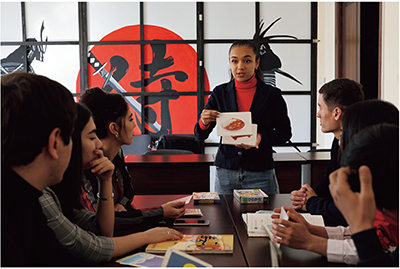 Class at the Japan Center (April 15, Bukhara, Uzbekistan; Photo: JICA/SHIBUYA Atsushi)
Class at the Japan Center (April 15, Bukhara, Uzbekistan; Photo: JICA/SHIBUYA Atsushi)At the same time, Japan is providing support for enhancing border control capabilities and preventing violent extremism in the Central Asian region where countries share a border with Afghanistan.
F The Middle East and North Africa
Securing peace and stability in the Middle East and North Africa regions, which are geopolitical keys in that they are the crossroads of Europe, sub-Saharan Africa and Asia, is crucial not only for the energy security of Japan but also for the stability of the world. From this point of view, Japan is providing support to achieve peace and stability in the region.
With regard to Syria, where civil war has been prolonged, Japan has provided more than 3.3 billion US dollars to Syria and surrounding countries since 2012 under its policy of providing humanitarian assistance to all Syrians facing difficulties. Parliamentary Vice-Minister for Foreign Affairs HONDA Taro participated in the “Supporting the future of Syria and the region, Brussels VI Conference,” organized by the EU in May in-person for the first time in three years. He stated that Japan will continue to fulfill the role in improving the humanitarian situation in Syria going forward with at least 90 million US dollars earmarked for this effort in 2022 in support of Syria and its neighboring regions. Furthermore, in order to foster human resources who could contribute to Syria's future reconstruction, 123 Syrian students have been accepted in Japan since 2017.
In regard to Palestine, based on the Corridor for Peace and Prosperity initiative with the aim of promoting economic and social self-reliance for Palestine promoted through cooperation between Japan, Israel, Palestine and Jordan, Japan assists the development of Jericho Agro-Industrial Park (JAIP). Since April, Japan has provided emergency grant aid assistance of 8.35 million US dollars through the United Nations Relief and Works Agency for Palestine Refugees in the Near East (UNRWA) in response to the significant deterioration in the humanitarian situation caused by the spread of COVID-19 in the Gaza Strip and flood damages. Furthermore, Japan provided 3 million US dollars in food aid through the UNRWA and WFP in August and September with the purpose of improving food security in Palestine and contributing to solutions to development issues there.
In Yemen, where a severe humanitarian crisis is still ongoing, Japan has provided more than 400 million US dollars in support since 2015. At the High-Level Pledging Event for the Humanitarian Crisis in Yemen held in March, Parliamentary Vice-Minister for Foreign Affairs Honda stated that Japan has decided to provide a total of at least approximately 23 million US dollars in assistance during 2022, and that will continue to offer support toward peace and stability in Yemen. Additionally, in 2022, Japan continued to offer humanitarian assistance and provided cooperation in the field of functional enhancement of the Port of Aden, fostering human resources through JICA trainings, health and medical care, and education through partnerships with international organizations.
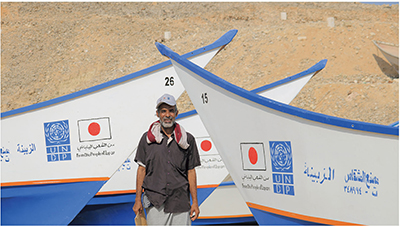 “Rebuilding Livelihoods and Capacities of Conflict-Affected Small-Scale Fisheries Households in Aden and Hadramout (RELACC)” joint grant aid project for Yemen with the UNDP (April 22, Aden, Yemen; Photo: UNDP)
“Rebuilding Livelihoods and Capacities of Conflict-Affected Small-Scale Fisheries Households in Aden and Hadramout (RELACC)” joint grant aid project for Yemen with the UNDP (April 22, Aden, Yemen; Photo: UNDP)Afghanistan is facing a serious humanitarian crisis since the Taliban took over Kabul in August 2021. Given this situation, Japan has been providing humanitarian support in areas such as health care, education, and food, including support for basic humanitarian needs, through collaboration with international organizations. Moreover, in response to the damage caused by an earthquake in eastern Afghanistan in June, Japan has coordinated with international organizations to provide emergency relief supplies, including blankets and medical assistance through JICA.
Human development is vital to realize stability in the Middle East in the mid- to long-term. As one example, through the technical cooperation project “Egypt-Japan University of Science and Technology (E-JUST) Project Phase 3,” Japan is providing support for the development of industrial human resources as well as science and technology human resources in Egypt, the Middle East and the Africa region. Furthermore, Japan has been providing support on school management and developing teaching staff capabilities through the yen loan Egypt-Japan School Support Program (Egypt-Japan Education Partnership). As of December 2022, 51 schools following the Japanese education model have opened.
G Africa
Africa has a population of approximately 1.4 billion people in 54 countries, and continues to attract attention and anticipation from the international community for its high potential in becoming the driving force for the world's growth, backed by its abundant natural resources. On the other hand, it also faces various challenges such as poverty, a vulnerable healthcare system, and the rise of terrorism and violent extremism. Given this background, Japan has been contributing for the development in Africa over the years through frameworks such as the Tokyo International Conference on African Development (TICAD). At TICAD 8 held in Tunisia in August, Prime Minister Kishida stated that Japan was going to make financial contributions of 30 billion US dollars in total from both the public and private sectors over the next three years, with an emphasis on “investment in people” and “quality of growth.” Japan declared its commitment to fostering the human resources development of 300,000 persons in a wide range of fields including industry, healthcare and medical care, education, agriculture, justice and public administration. It is also committed to working toward green growth, investment promotion, development finance, healthcare and public health, regional stabilization and food security, among others. As “a partner growing together with Africa,” Japan will promote African development with approaches quintessentially Japanese, focusing on “people” to realize the resilient Africa that Africa itself aims to achieve.
Based on this philosophy, Japan has set out concrete initiatives at TICAD 8 around the three pillars of economy, society, and peace and stability.
In the pillar of Economy, Japan aims to realize a resilient and sustainable Africa through providing support toward green growth and achieving transparent and fair development of finance in each African country, as well as through promoting quality infrastructure investment to enhance connectivity. Furthermore, in terms of “investment in people,” Japan also declared its intent to foster industrial human resources who will promote businesses in Africa and support start-up and entrepreneurs through programs such as the African Business Education Initiative for Youth (ABE initiative)7. Furthermore, in response to the worsening food crisis in Africa due to the soaring costs of food, fertilizers and energy globally, Japan has announced it will provide short-term support, including food aid. Moreover, Japan will continue to contribute to enhancing food security in Africa through both medium- and long-term assistance, including co-financing of approximately 300 million US dollars for the African Development Bank (AfDB) Emergency Food Production Facility and improving agricultural production capacity.
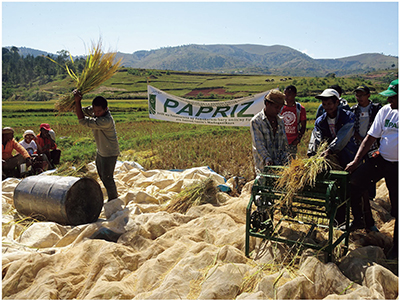 Threshing training for farmers in Madagascar to double rice production (April 28, Analamanga, Madagascar; Photo: JICA)
Threshing training for farmers in Madagascar to double rice production (April 28, Analamanga, Madagascar; Photo: JICA) Refugees living in Uganda learning rice cultivation techniques together with host community members (August, Adjumani, Uganda; Photo: JICA/HISANO Takeshi)
Refugees living in Uganda learning rice cultivation techniques together with host community members (August, Adjumani, Uganda; Photo: JICA/HISANO Takeshi)Under the pillar of Society, Japan announced it will continue initiatives in response to COVID-19, including the Last One Mile Support. Furthermore, Japan will further enhance its initiatives aimed at achieving universal health coverage (UHC)8 through infectious disease control, fostering medical care human resources, and developing health and medical care facilities. Moreover, Japan will provide high quality education, including STEM education9, to nine million students and improve access to education for four million female students.
Under the pillar of Peace and Stability, in addition to providing support aimed at maintaining and strengthening the rule of law, including training for police officers and border control assistance, Japan is providing human resource development to build institutions and strengthen governance in the judicial and administrative fields, as well as providing support for ensuring public safety, under the New Approach for Peace and Stability in Africa (NAPSA) (see A (B) b on page 221).
Moreover, Japan also provides assistance for community-level cooperative programs between residents and local government in support of Africa-led efforts aimed at establishing peace and stability.
- 7 An initiative that provides business programs including opportunities to obtain a master's degree at a Japanese university, internships at Japanese companies, Japanese language training, and business skills training for African youth in order to develop “pilots” supporting the development of industrial human resources in Africa and Japanese companies looking to do business in Africa.
- 8 Universal Health Coverage (UHC) :To ensure that all people can receive the quality health services they need at an affordable cost without financial hardship.
- 9 Education in Science, Technology, Engineering and Mathematics (STEM education)
(6) Approaches to Appropriate and Effective Implementation of ODA
A Approaches to Appropriate Implementation of ODA
In the implementation of ODA, efforts are made to enhance transparency and quality by listening to the views of external experts at each phase and formulating projects based on these opinions. In the phase of preliminary studies prior to the implementation of ODA, MOFA holds the Development Project Accountability Committee meeting in public, exchanges views with independent committee members that have knowledge of the relevant fields and affirms the validity of the project. Furthermore, JICA publishes ex-post evaluation results for all projects valued at 200 million yen or more (2,987 projects published as of the end of December 21, 2022) on the “ODA Mieru-ka Site” after the implementation of the projects in view of enhancing the transparency of the projects. Ex-post evaluations for projects valued at 1 billion Japanese yen or more are conducted by third parties. MOFA conducts third party evaluations at the policy level (such as country assistance evaluations, thematic evaluations and aid modality evaluations) and ex-post evaluations on grant aid projects implemented by MOFA to improve ODA management and ensure accountability. Efforts are made to utilize the lessons drawn from the evaluation results for the policy formulation and project implementation of future ODA. MOFA also publishes the evaluation results on its website.
JICA has adopted the JICA Guidelines for Environmental and Social Considerations to implement projects in accordance with environmental and social considerations. In 2022, the Guidelines were revised based on the response of the international community to the threats of climate change, etc.
B Approaches to Effective Implementation of ODA
ODA is implemented through three frameworks corresponding to the needs of the partner country and the scale of the project: grant aid, loan aid and technical cooperation. In order to utilize the limited budget efficiently and achieve a high level of development effectiveness, MOFA formulates a development cooperation policy for each country that defines the priority areas and policies of ODA, comprehensively taking into account the development plans and development challenges of respective partner counties. Moreover, the Rolling Plan is formulated as an appendix to the Country Development Cooperation Policy, with a summary for quick reference on how each individual ODA project is associated with a specific priority area. Through these efforts, the policy of development cooperation in each country is clearly identified, enabling more strategic projects to be formed across the confines of each framework.
C Efforts with regard to International Discussions on ODA
Japan also contributes actively to international discussions on ODA. At the Organisation for Economic Co-operation and Development's Development Assistance Committee (OECD/DAC), discussions are being held on promotion of mobilization of private-sector funds with ODA as a catalyst, and assistance for climate change related issues. In addition, OECD/DAC is working to provide opportunities for mutual learning so that development assistance provided by emerging donors will be accountable and transparent in a manner consistent with international standards and practices.
D Efforts toward Promoting Understanding of ODA
It is vital to have the understanding and support of the people when implementing development cooperation. To that end, efforts are made to promote understanding among the citizens through the effective dissemination of information. MOFA strives to promote publicity on its political measures on Japan's development cooperation activities among a wider range of targets in an easy-to-understand manner through social media, such as the MOFA website, ODA Twitter account, as well as through YouTube videos, e-mail subscriptions, and other tools. Specifically, MOFA has expanded the short animation series “Go! ODA-Man” based on the popular anime “Eagle Talon,” and created new documentary videos and television drama on development cooperation, etc. Furthermore, with this year marking the 31st anniversary of the event, Global Festa Japan was held both online and in person as a hybrid event, which attracted more than 22,000 participants in person and online in two days. In FY2022, MOFA has continued to dispatch ministry officials in actively conducting “ODA Delivery Lectures” as a part of its efforts to promote understanding of development cooperation via virtual lectures online, as well as resumed in-person lectures. In addition, MOFA makes active efforts in overseas publicity, including plans for site-visit tours to its development cooperation project for the local media so that they will also cover Japan's cooperation, and issues PR pamphlets and materials in English and local languages.
 First Step: Sekai wo Tsunagu Ainoshirushi, Television drama currently being aired (as of February 2023) (Japanese only)
First Step: Sekai wo Tsunagu Ainoshirushi, Television drama currently being aired (as of February 2023) (Japanese only)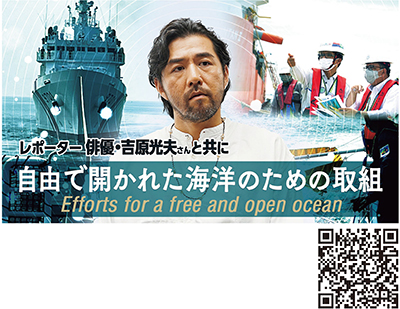 Efforts for a free and open ocean Documentary movie about ODA involving the ocean
Efforts for a free and open ocean Documentary movie about ODA involving the oceanhttps://www.youtube.com/playlist?app=desktop&list=PLz2FHGxPcAlg4eP_P6KRY0v8dKWtaGsdS

